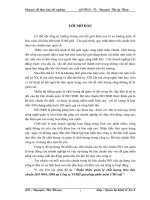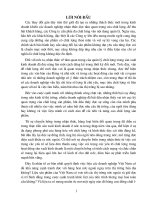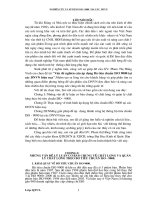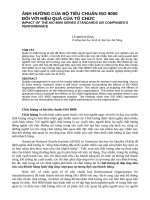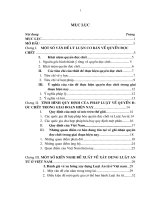Tiêu chuẩn iso 00105 e06 2006
Bạn đang xem bản rút gọn của tài liệu. Xem và tải ngay bản đầy đủ của tài liệu tại đây (112.34 KB, 8 trang )
INTERNATIONAL
STANDARD
ISO
105-E06
Fourth edition
2006-07-15
Textiles — Tests for colour fastness —
Part E06:
Colour fastness to spotting: Alkali
Textiles — Essais de solidité des teintures —
Partie E06: Solidité des teintures aux alcalis
Reference number
ISO 105-E06:2006(E)
--`,,```,,,,````-`-`,,`,,`,`,,`---
Copyright International Organization for Standardization
Provided by IHS under license with ISO
No reproduction or networking permitted without license from IHS
© ISO 2006
Not for Resale
ISO 105-E06:2006(E)
PDF disclaimer
This PDF file may contain embedded typefaces. In accordance with Adobe's licensing policy, this file may be printed or viewed but
shall not be edited unless the typefaces which are embedded are licensed to and installed on the computer performing the editing. In
downloading this file, parties accept therein the responsibility of not infringing Adobe's licensing policy. The ISO Central Secretariat
accepts no liability in this area.
Adobe is a trademark of Adobe Systems Incorporated.
--`,,```,,,,````-`-`,,`,,`,`,,`---
Details of the software products used to create this PDF file can be found in the General Info relative to the file; the PDF-creation
parameters were optimized for printing. Every care has been taken to ensure that the file is suitable for use by ISO member bodies. In
the unlikely event that a problem relating to it is found, please inform the Central Secretariat at the address given below.
© ISO 2006
All rights reserved. Unless otherwise specified, no part of this publication may be reproduced or utilized in any form or by any means,
electronic or mechanical, including photocopying and microfilm, without permission in writing from either ISO at the address below or
ISO's member body in the country of the requester.
ISO copyright office
Case postale 56 • CH-1211 Geneva 20
Tel. + 41 22 749 01 11
Fax + 41 22 749 09 47
Web www.iso.org
Published in Switzerland
ii
Copyright International Organization for Standardization
Provided by IHS under license with ISO
No reproduction or networking permitted without license from IHS
© ISO 2006 – All rights reserved
Not for Resale
ISO 105-E06:2006(E)
Foreword
ISO (the International Organization for Standardization) is a worldwide federation of national standards bodies
(ISO member bodies). The work of preparing International Standards is normally carried out through ISO
technical committees. Each member body interested in a subject for which a technical committee has been
established has the right to be represented on that committee. International organizations, governmental and
non-governmental, in liaison with ISO, also take part in the work. ISO collaborates closely with the
International Electrotechnical Commission (IEC) on all matters of electrotechnical standardization.
International Standards are drafted in accordance with the rules given in the ISO/IEC Directives, Part 2.
The main task of technical committees is to prepare International Standards. Draft International Standards
adopted by the technical committees are circulated to the member bodies for voting. Publication as an
International Standard requires approval by at least 75 % of the member bodies casting a vote.
Attention is drawn to the possibility that some of the elements of this document may be the subject of patent
rights. ISO shall not be held responsible for identifying any or all such patent rights.
ISO 105-E06 was prepared by Technical Committee ISO/TC 38, Textiles, Subcommittee SC 1, Tests for
coloured textiles and colorants.
This fourth edition cancels and replaces the third edition (ISO 105-E06:1989), which has been technically
revised. It also incorporates Technical Corrigendum ISO 105-E06:1989/Cor. 1:2002.
ISO 105 was previously published in 13 “parts”, each designated by a letter (e.g. “Part A”), with publication
date between 1978 and 1985. Each part contained a series of “sections”, each designated by the respective
part letter and by a two-digit serial number (e.g. “Section A01”). These sections are now being republished as
separate documents, themselves designated "parts" but retaining their earlier alphanumeric designations. A
complete list of these parts is given in ISO 105-A01.
--`,,```,,,,````-`-`,,`,,`,`,,`---
iii
© ISO 2006 – All rights reserved
Copyright International Organization for Standardization
Provided by IHS under license with ISO
No reproduction or networking permitted without license from IHS
Not for Resale
--`,,```,,,,````-`-`,,`,,`,`,,`---
Copyright International Organization for Standardization
Provided by IHS under license with ISO
No reproduction or networking permitted without license from IHS
Not for Resale
INTERNATIONAL STANDARD
ISO 105-E06:2006(E)
Textiles — Tests for colour fastness —
Part E06:
Colour fastness to spotting: Alkali
1
Scope
This part of ISO 105 specifies a method for determining the resistance of the colour of textiles of all kinds, and
in all forms, to the action of dilute alkaline solutions.
Three tests differing in severity are provided. Any or all may be used, depending on the nature of the fibre.
2
Normative references
The following referenced documents are indispensable for the application of this document. For dated
references, only the edition cited applies. For undated references, the latest edition of the referenced
document (including any amendments) applies.
ISO 105-A01, Textiles — Tests for colour fastness — Part A01: General principles of testing
ISO 105-A02, Textiles — Tests for colour fastness — Part A02: Grey scale for assessing change in colour
ISO 105-A05, Textiles — Tests for colour fastness — Part A05: Instrumental assessment of change in colour
for determination of grey scale rating
ISO 105-E07, Textiles — Tests for colour fastness — Part E07: Colour fastness to spotting: Water
3
Principle
The specimens are steeped in or spotted with prepared reagents by means of simple laboratory equipment.
The change in the colour of the textile, while it is still wet and after drying, is assessed either visually or
instrumentally.
4
Reagents and materials
4.1
Pipette or dropper.
4.2
Glass rod, with rounded end.
4.3
Glass beaker.
4.4
Grey scale for assessing change in colour, complying with ISO 105-A02.
4.5 Sodium carbonate solution, containing 100 g of anhydrous sodium carbonate (Na2CO3) per litre of
water (4.8).
© ISO 2006 – All rights reserved
Copyright International Organization for Standardization
Provided by IHS under license with ISO
No reproduction or networking permitted without license from IHS
1
--`,,```,,,,````-`-`,,`,,`,`,,`---
Not for Resale
ISO 105-E06:2006(E)
4.6 Calcium hydroxide paste, containing 1 g of calcium hydroxide [Ca(OH)2] mixed with 1 g to 2 g of
water (4.8).
--`,,```,,,,````-`-`,,`,,`,`,,`---
4.7
Ammonium hydroxide, solution containing 28 % of ammonium hydroxide (NH4OH).
4.8
Grade 3 water (see ISO 105-A01).
NOTE
5
See Table 1 for a list of the chemicals and pH levels of the reagents used in this method.
Test specimen
5.1
Prepare a test specimen as described in 5.2 to 5.4 for each alkali to be used.
5.2
If the textile to be tested is fabric, use a specimen measuring 40 mm × 100 mm.
5.3 If the textile to be tested is yarn, knit it into fabric and use a specimen measuring 40 mm × 100 mm, or
make a wick of parallel lengths 100 mm long and about 5 mm in diameter, tied near both ends.
5.4 If the textile to be tested is loose fibre, comb and compress enough of it to form a sheet measuring
40 mm × 100 mm.
6
Procedure
6.1
Sodium carbonate
6.1.1 Place the specimen in a clean dry flat-bottomed dish. Spot the specimen at room temperature with the
sodium carbonate solution (4.5) so that after working the solution into the specimen with the glass rod, a spot
of diameter approximately 20 mm is formed. In the case of water-repellent fabrics, the amount of solution shall
not exceed 0,5 ml.
6.1.2 Place the specimen on a flat surface and allow to dry at room temperature; brush it to remove the
sodium carbonate residues.
6.1.3 If brushing is not enough to completely eliminate the whitish ring caused by spotting with sodium
carbonate, rinse the specimen in a glass beaker for 1 min with 100 ml of Grade 3 water (4.8) at room
temperature. Allow the specimen to dry at room temperature.
6.2
6.2.1
Calcium hydroxide
Spot the specimen at room temperature with the calcium hydroxide paste (4.6).
6.2.2 Place the specimen on a flat surface and allow to dry at room temperature; brush it to remove the
calcium hydroxide residues.
6.2.3 If brushing is not enough to completely eliminate the whitish ring caused by spotting with calcium
hydroxide, rinse the specimen in a glass beaker for 1 min with 100 ml of Grade 3 water (4.8) at room
temperature. Allow the specimen to dry at room temperature.
6.3
Ammonium hydroxide
6.3.1
Steep the specimen for 2 min in ammonium hydroxide solution (4.7) at room temperature.
6.3.2
Place the specimen on a flat surface and allow to dry at room temperature without rinsing.
2
Copyright International Organization for Standardization
Provided by IHS under license with ISO
No reproduction or networking permitted without license from IHS
© ISO 2006 – All rights reserved
Not for Resale
ISO 105-E06:2006(E)
6.4
Assess the change in colour
Assess the change in colour of the specimen using either the grey scale or instrumentally (See ISO 105-A02
and ISO 105-A05) for each alkali used. Assess the change in colour of the wet spot after 10 min, if applicable.
6.5
Resistance to water spotting
It is recommended that the test for resistance to water spotting (see ISO 105-E07) also be carried out to
ascertain that the change in colour is not due to the action of water alone.
7
Test report
The test report shall include the following:
a)
a reference to this part of ISO 105 (ISO 105-E06:2006);
b)
all details necessary for the identification of the sample tested;
c)
the numerical grey scale rating or instrumental assessment for change in colour of the specimen for each
type of alkali used and for change when wet, if of interest;
d)
the result of the resistance to water spotting (6.5);
e)
any deviation, by agreement or otherwise, from the procedure specified.
Table 1 —pH levels of chemicals used
Chemical
pH
Ammonium hydroxide
13,5 – 13,7
Calcium hydroxide
12,3 – 12,5
Sodium carbonate
11,5 – 11,7
© ISO 2006 – All rights reserved
Copyright International Organization for Standardization
Provided by IHS under license with ISO
No reproduction or networking permitted without license from IHS
--`,,```,,,,````-`-`,,`,,`,`,,`---
Not for Resale
3
ISO 105-E06:2006(E)
ICS 59.080.01
Price based on 3 pages
--`,,```,,,,````-`-`,,`,,`,`,,`---
© ISO 2006 – All rights reserved
Copyright International Organization for Standardization
Provided by IHS under license with ISO
No reproduction or networking permitted without license from IHS
Not for Resale
